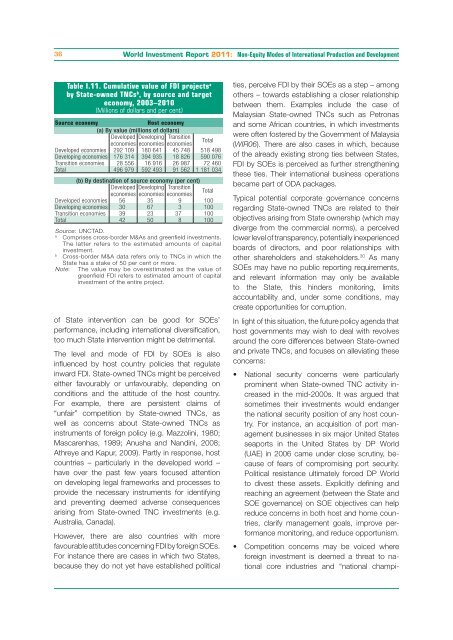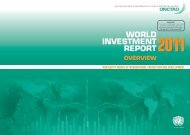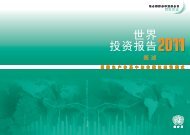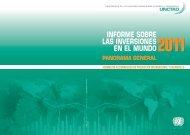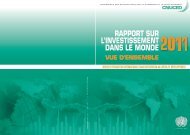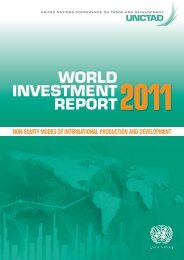CHAPTER I Global Investment Trends
CHAPTER I Global Investment Trends
CHAPTER I Global Investment Trends
Create successful ePaper yourself
Turn your PDF publications into a flip-book with our unique Google optimized e-Paper software.
36<br />
World <strong>Investment</strong> Report 2011: Non-Equity Modes of International Production and Development<br />
Table I.11. Cumulative value of FDI projects a<br />
by State-owned TNCs b , by source and target<br />
economy, 2003–2010<br />
(Millions of dollars and per cent)<br />
Source economy Host economy<br />
(a) By value (millions of dollars)<br />
Developed Developing Transition<br />
economies economies economies<br />
Total<br />
Developed economies 292 109 180 641 45 748 518 498<br />
Developing economies 176 314 394 935 18 826 590 076<br />
Transition economies 28 556 16 916 26 987 72 460<br />
Total 496 979 592 493 91 562 1 181 034<br />
(b) By destination of source economy (per cent)<br />
Developed Developing Transition<br />
economies economies economies<br />
Total<br />
Developed economies 56 35 9 100<br />
Developing economies 30 67 3 100<br />
Transition economies 39 23 37 100<br />
Total 42 50 8 100<br />
Source: UNCTAD.<br />
a Comprises cross-border M&As and greenfield investments.<br />
The latter refers to the estimated amounts of capital<br />
investment.<br />
b Cross-border M&A data refers only to TNCs in which the<br />
State has a stake of 50 per cent or more.<br />
Note: The value may be overestimated as the value of<br />
greenfield FDI refers to estimated amount of capital<br />
investment of the entire project.<br />
of State intervention can be good for SOEs’<br />
performance, including international diversification,<br />
too much State intervention might be detrimental.<br />
The level and mode of FDI by SOEs is also<br />
influenced by host country policies that regulate<br />
inward FDI. State-owned TNCs might be perceived<br />
either favourably or unfavourably, depending on<br />
conditions and the attitude of the host country.<br />
For example, there are persistent claims of<br />
“unfair” competition by State-owned TNCs, as<br />
well as concerns about State-owned TNCs as<br />
instruments of foreign policy (e.g. Mazzolini, 1980;<br />
Mascarenhas, 1989; Anusha and Nandini, 2008;<br />
Athreye and Kapur, 2009). Partly in response, host<br />
countries – particularly in the developed world –<br />
have over the past few years focused attention<br />
on developing legal frameworks and processes to<br />
provide the necessary instruments for identifying<br />
and preventing deemed adverse consequences<br />
arising from State-owned TNC investments (e.g.<br />
Australia, Canada).<br />
However, there are also countries with more<br />
favourable attitudes concerning FDI by foreign SOEs.<br />
For instance there are cases in which two States,<br />
because they do not yet have established political<br />
ties, perceive FDI by their SOEs as a step – among<br />
others – towards establishing a closer relationship<br />
between them. Examples include the case of<br />
Malaysian State-owned TNCs such as Petronas<br />
and some African countries, in which investments<br />
were often fostered by the Government of Malaysia<br />
(WIR06). There are also cases in which, because<br />
of the already existing strong ties between States,<br />
FDI by SOEs is perceived as further strengthening<br />
these ties. Their international business operations<br />
became part of ODA packages.<br />
Typical potential corporate governance concerns<br />
regarding State-owned TNCs are related to their<br />
objectives arising from State ownership (which may<br />
diverge from the commercial norms), a perceived<br />
lower level of transparency, potentially inexperienced<br />
boards of directors, and poor relationships with<br />
other shareholders and stakeholders. 30 As many<br />
SOEs may have no public reporting requirements,<br />
and relevant information may only be available<br />
to the State, this hinders monitoring, limits<br />
accountability and, under some conditions, may<br />
create opportunities for corruption.<br />
In light of this situation, the future policy agenda that<br />
host governments may wish to deal with revolves<br />
around the core differences between State-owned<br />
and private TNCs, and focuses on alleviating these<br />
concerns:<br />
• National security concerns were particularly<br />
prominent when State-owned TNC activity increased<br />
in the mid-2000s. It was argued that<br />
sometimes their investments would endanger<br />
the national security position of any host country.<br />
For instance, an acquisition of port management<br />
businesses in six major United States<br />
seaports in the United States by DP World<br />
(UAE) in 2006 came under close scrutiny, because<br />
of fears of compromising port security.<br />
Political resistance ultimately forced DP World<br />
to divest these assets. Explicitly defining and<br />
reaching an agreement (between the State and<br />
SOE governance) on SOE objectives can help<br />
reduce concerns in both host and home countries,<br />
clarify management goals, improve performance<br />
monitoring, and reduce opportunism.<br />
• Competition concerns may be voiced where<br />
foreign investment is deemed a threat to national<br />
core industries and “national champi-


